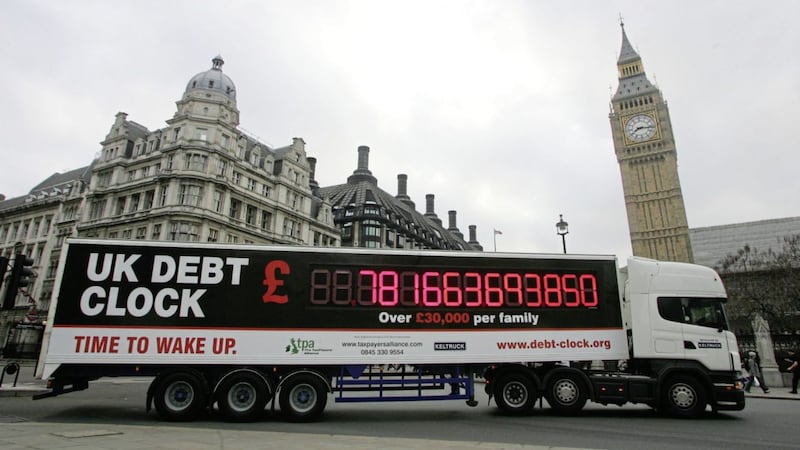I WASN'T brought up on debt. It wasn't an option I suppose, and the minute I borrowed my first pound, I felt regret. There was no greater moment than repaying that loan for the car that made me 'cool' and temporarily altered my cloudy opinion of myself.
Today, you could argue that in a world where everyone is taking selfies, you shouldn't bother trying to look cool, as no-one is looking at you anyway.
That hasn't stopped the extraordinary borrowing levels which cripple independence both for the person and country alike. Whilst debt isn't bad per se, debt borrowed badly is.
A little trip to www.nationaldebtclock.co.uk is pretty illuminating as you watch the UK's debt (currently £1.87 trillion) rise at £5,170 per second and interest per year at over £45 billion.
Translated into dollars and piling them on top of each other, they would take you nearly 164,000 miles – or 69 per cent of the way to the moon in height.
It's worth pointing out that the above excludes public sector bank bailouts. If we include other liabilities such as state and public sector pensions the figure climbs to £4.8 trillion.
I've always believed credit cards are to buy things you don't need with money you don't have. Debt enslaves and reduces your options and if I could do one thing it would be to eradicate it where possible.
Currently credit card debt sits at a staggering £68 billion, which will be crucifying the borrower struggling to make the minimum payments, whilst at the same time interest is rolling up at an average of 21.6 per cent, with the worst card at 59.9 per cent.
The UK's current 'stability' has been fuelled by consumer spending which will have to come to an end, and with the recent interest rate vote coming very close to a rise, the writing on the wall has already had a stencil manufactured.
Amazingly more than 300,000 people in the UK are too poor to go bankrupt as they cannot even afford the £525 fee to do so, but most staggering, is that eight million households in Britain have no savings - one of the worst statistics in the EU.
Whilst Mark Carney plays down the overall vulnerability of UK households, stating that consumer debt is small in relation to the overall borrowing (i.e. mortgages etc. included), the rates of the consumer credit are much more exposed to rate rises.
The Financial Ombudsman highlights the cost of payday loans and pawn broking. Pawn broking secures a loan against a person's engagement ring for example, which is handed back on repayment of the loan and its interest. About £700m is loaned each year at a maximum rate which equates to 165 per cent per year.
Currently 3.3m people are in persistent debt that never ceases and are missing out on some simple easy steps, and they work, I promise
Firstly, be strong, make the call and let your lender know your situation. Eat the toad. Google it. By law, you can only be asked to repay what you can afford. It is against the law for creditors to hassle you, so relax.
In a recent scenario, a borrower who was paying near 30 per cent on average on interest rates on credit cards couldn't get into a position to repay the debt as the interest was too much. They were paralysed.
We told them to contact the lenders and explain their financial situation. As a result they had interest rates frozen at 0 per cent with some lenders, and with others, reduced by 36 per cent per year. This had been going on for some time and they kicked themselves for not doing it earlier. This will allow them to make the payments back against the capital and reduce the debt exponentially.
If you have a credit card debt and have equity in your home consider borrowing to repay it. With mortgage rates at 1.72 per cent fixed for five years, why would you be borrowing at 22 to 59 per cent on a credit card? The lower interest rate will allow you to apply your payment as above to the loan rather than the interest rate, putting you back in control.
:: Peter McGahan is the owner of independent financial adviser Worldwide Financial Planning, which is authorised and regulated by the Financial Conduct Authority. If you have a question on protecting your investments call Darren McKeever on 028 6863 2692, email dmckeever@wwfp.net or visit us on www.wwfp.net.








